You don’t own it if they can break it

Welcome to the July edition of the Open Home Foundation newsletter, the place to learn about the latest and greatest things for your smart home that improve its privacy, choice, and sustainability.
The Open Home newsletter is written by Paulus Schoutsen - President of the Open Home Foundation, and founder of Home Assistant. Was this email forwarded to you? Subscribe here!
July is here, and summer is once again in full swing. I hope you all are enjoying some well-earned downtime. I certainly am, as I'm on vacation in Europe right now (yes, I scheduled this post). Originally, I was going to write a “light” newsletter about taking a break from your smart home. But instead, I’ve found myself writing something “heavy” about three companies, which are reminding us all why local control is so vital in a world where companies keep rug-pulling their users in new and terrible ways.
Before all that, I would like to ask you to save the date on Wednesday, August 13, for a very special live stream! We will reveal the latest product we have been working on… though for all of you paying attention (for instance, we mentioned it a bit in the last State of the Open Home), you can probably guess what it is.
One Ring to watch them all
Things are shaking up over at video surveillance company Ring. Its founder, Jamie Siminoff, has rejoined Ring and is making sweeping changes straight away.
While Siminoff was away, Ring softened its public image under Hamren's leadership. The company leaned into a more community-focused brand and distanced itself from the surveillance tools that previously sparked privacy concerns.
Hamren retired a controversial feature that allowed law enforcement to request footage from Ring users through the Neighbors app and introduced a more approachable mission statement last year.
Now, Siminoff is rolling back much of that vision, steering Ring back to its original role as a neighborhood crime watchdog.
As you can imagine, I think there is a lot wrong with this, and I wouldn’t mind if people decide to toss their Ring products into the nearest volcano over it (thanks to Evacide for that mental image).
If you are not familiar with Ring’s first stab at being a “neighborhood crime watchdog”, it gave its users’ video recordings to the police without consent or a warrant. Public pressure forced the company to change its ways, but now it looks like it will end up pivoting right back to where it started.
None of this would even be an issue if Ring’s cameras worked locally. These cameras store your recordings in the cloud, on servers that Ring controls. Ring just pulls up all this user data onto its services, and once there, it treats this data like its own, giving it to whoever it wants.
Ring shouldn’t do this with user data, but again, this is why the Open Home Foundation preaches a local-first approach, removing the risks of these things happening in the first place. If your recordings are stored on a hard drive in your own home, under your own control, no other entity has the ability to share them today or even after a future leadership change.
If you have recently dropped your Ring doorbell into Mount Doom, and are wondering what camera manufacturer you can trust that works locally… we think highly of Reolink, which is why they’re a Works With Home Assistant partner.
Belkin pulls the plug
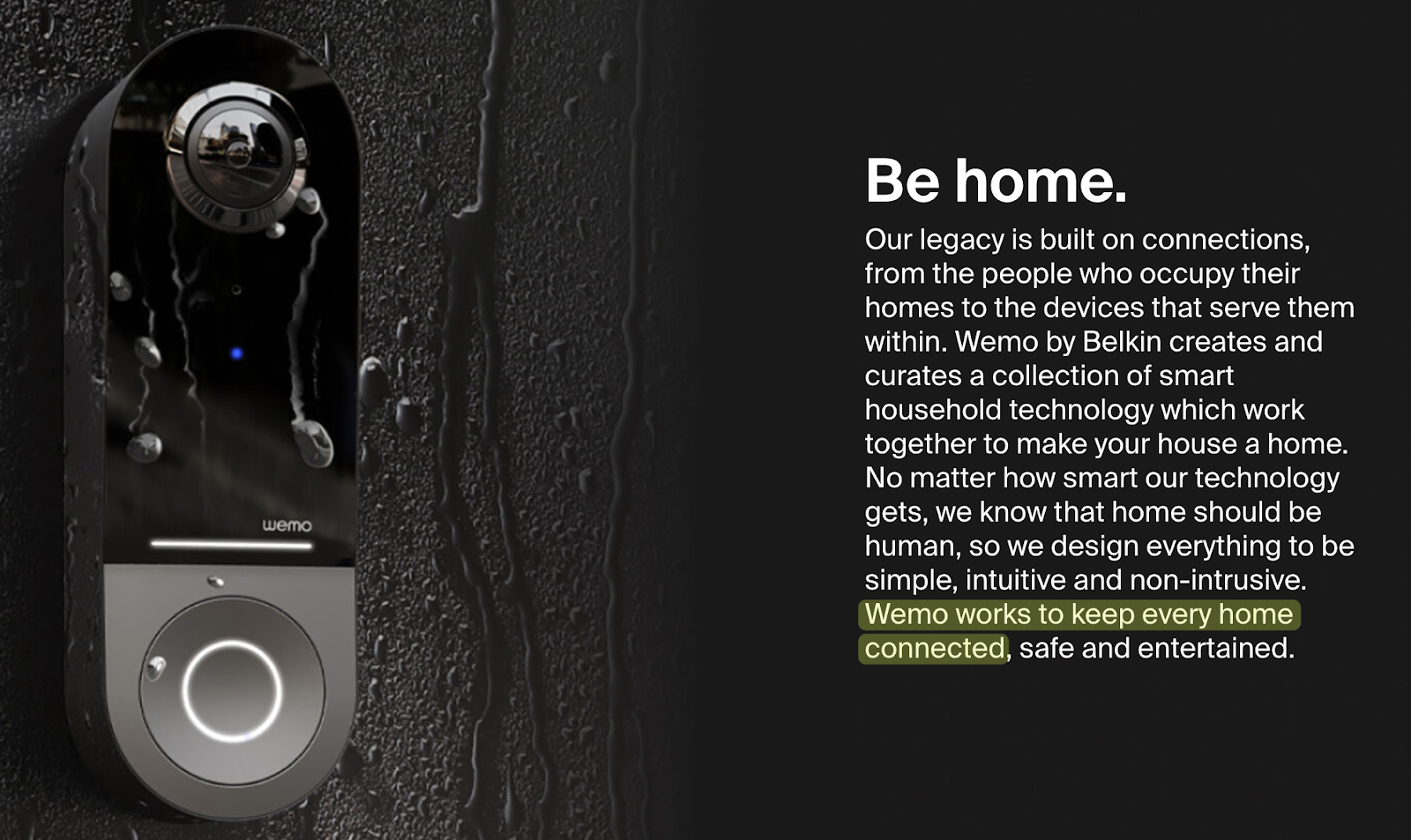
I’ve long said that smart home products that rely on the cloud are on borrowed time. Without local control, one day those cloud services will be disabled or updated to a point where that product is no longer supported. This often leaves you with a fancy smart home device-shaped paperweight.
This month, Belkin decided to prove me right again, announcing that it will brick the majority of its Wemo line. Any features that rely on Belkin’s cloud, including its own app, will stop working on January 31, 2026, turning most Wemo devices (including some that could have been bought less than two years ago) into e-waste. Literally, as its announcement says:
For any Wemo devices you have that are out of warranty, will not work with HomeKit or if you are unable to use HomeKit, we recommend disposing of these devices at an authorized e-waste recycling center.
The Wemo integration will keep working locally in Home Assistant for those who have already set it up. But I believe that without Belkin’s cloud and app, devices fresh out of the box can’t be set up to work with Home Assistant, nor can devices be reactivated if they are ever factory reset. So while your devices may still work for now, Wemo devices are ultimately a dead end.
As Ars Technica’s Scharon Harding notes, it’s remarkable how easily companies like Belkin neglect the people who bought its products and supported them in the first place.
It’s alarming how easy it is for smart device makers to decide that your property won’t work. There’s no easy solution to this problem. However, the lack of accountability carried by companies that brick customer devices neglects the people who support smart tech companies.
We do think there’s an easy solution though. Don’t buy products that rely on the manufacturer’s cloud.
Bricked homes
Maybe the old adage is true: Bad news does come in threes. Norwegian smart home company Futurehome has managed to surpass Belkin. On his YouTube channel, Louis Rossmann dives into the details of this company that bricked customers’ smart homes.
Futurehome sold its smart home hub to 38,000 Norwegian customers, with a promise of no subscription fees after the initial purchase. Again, never trust the promise of free-forever cloud services; they don’t exist, and there is always risk involved.
After Futurehome went bankrupt, the company that took over operations decided to move to a subscription model, because of course it would 🤦♂️. It now demanded an annual fee from all existing customers to use the functionality of their hubs that was previously free.
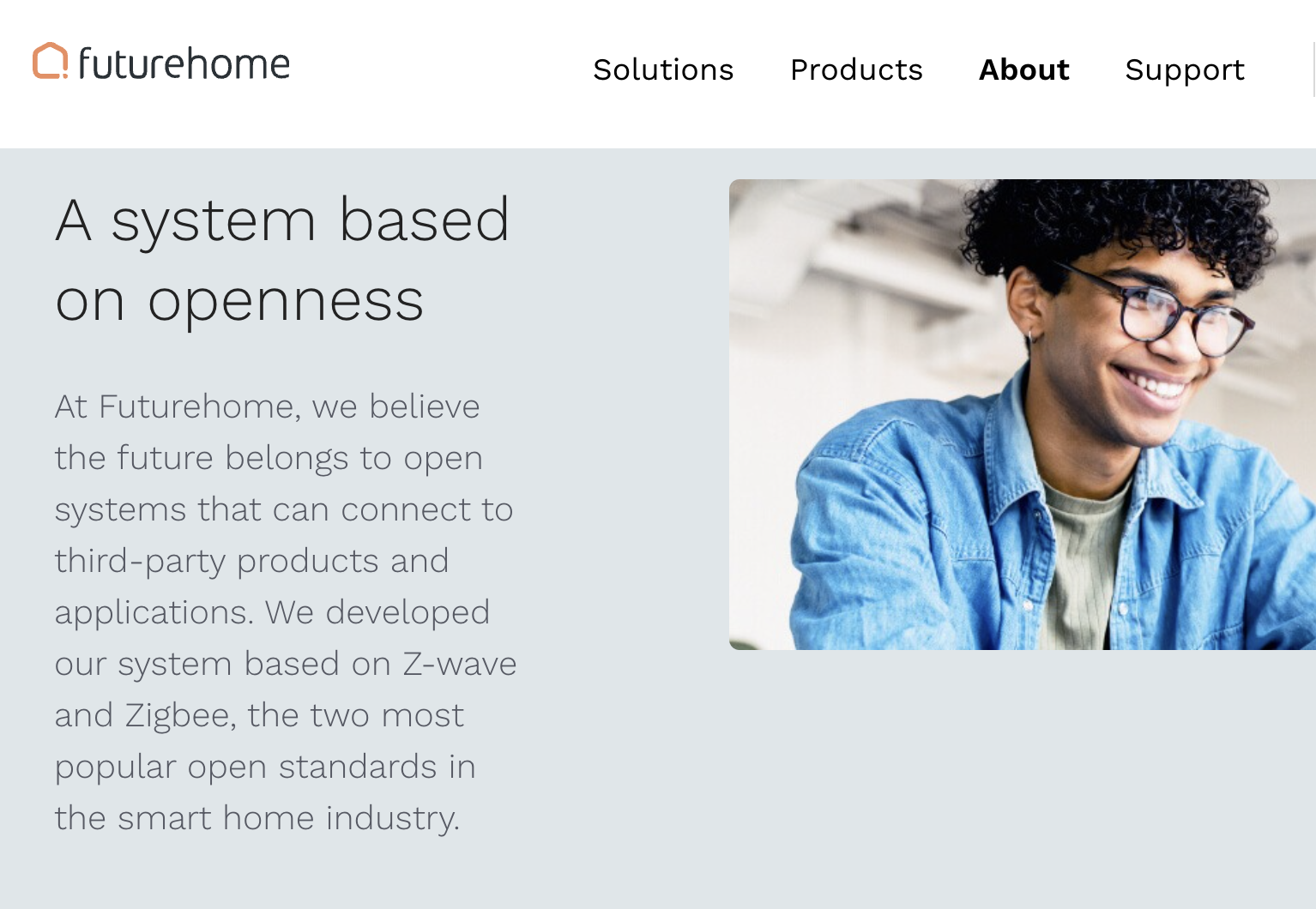
So far, this is just another tale of a tech company changing its business model to the detriment of its customers; disappointing but not unheard of. What makes this story special is that this new Futurehome then remotely installed a firmware update on the hubs of its customers, which disabled functionality if the customers refused to pay the fee. And according to a Futurehome employee, this was by design.
One Futurehome software engineer, speaking on condition of anonymity, confirmed that the firmware was designed to enforce this lockout mechanism and compel users to subscribe.
But customers did not just lose access to Futurehome’s cloud services thanks to this ‘lockout mechanism’, they lost access to local operation as well: the mobile app, all automations, and the hub's local API integrations.
Customers who do not activate the subscription within that trial window face the following restrictions:
- App access disabled: Users can't use the app remotely via cloud or on the local network.
- Automations and modes frozen: All user-defined automations, preset modes (Home/Away/Night, etc.), shortcuts, and energy management features stop working.
- Local API and MQTT disabled: The hub's developer interfaces remain active only for a short grace period after the trial, then are gradually shut off without an active subscription.
- Physical control only: Basic manual control of devices continues to work: the smart devices revert to "dumb" mode with no central coordination.
Futurehome installed firmware that turned smart home hubs into dumb homes, disabling local operation, without the consent of the people who actually owned these hubs. By doing so, it single-handedly managed to break our advice that ‘if it is local, it will keep working’.
Go local or get screwed
So there you have it, three stories in just a single month (‼) about the cloud putting consumers in bad positions. When you rely on the cloud, the rules can be changed under your feet, devices can be made useless, or worse, be fundamentally changed and ruined remotely.
I think we can all agree these companies have crossed the line, and if you want to help do something about it, consider working with me at the Open Home Foundation. We will always stay true to our values, so take a look at our jobs page as new opportunities are added every week! In fact, when it comes to our values…
Transparency

I am very proud this month that the Open Home Foundation has improved our transparency by sharing important legal documents on our website. While I know many of you probably never read these kinds of things, the accountability they provide is critical. At the end of the day, these documents are proof that we have proper structure and governance in place, that we continue working on the mission the foundation was established for, and ultimately that you can trust us.
So far, we’ve shared the Public Deed and Organizational Regulations of the Open Home Foundation, which outline the foundation’s legal purpose and structure. We’ve also shared the regulations and resolutions concerning Working Groups, the entities created within the foundation to operate specific programs or functions. We currently have a working group for the Works With Home Assistant program, and a working group dedicated to keeping the technical infrastructure of the foundation running.
This is just the start! To make sure the community understands our work and impact, we will update this page with more documentation as we go, including regulatory filings, financial reports, and other agreements.
This month in the news
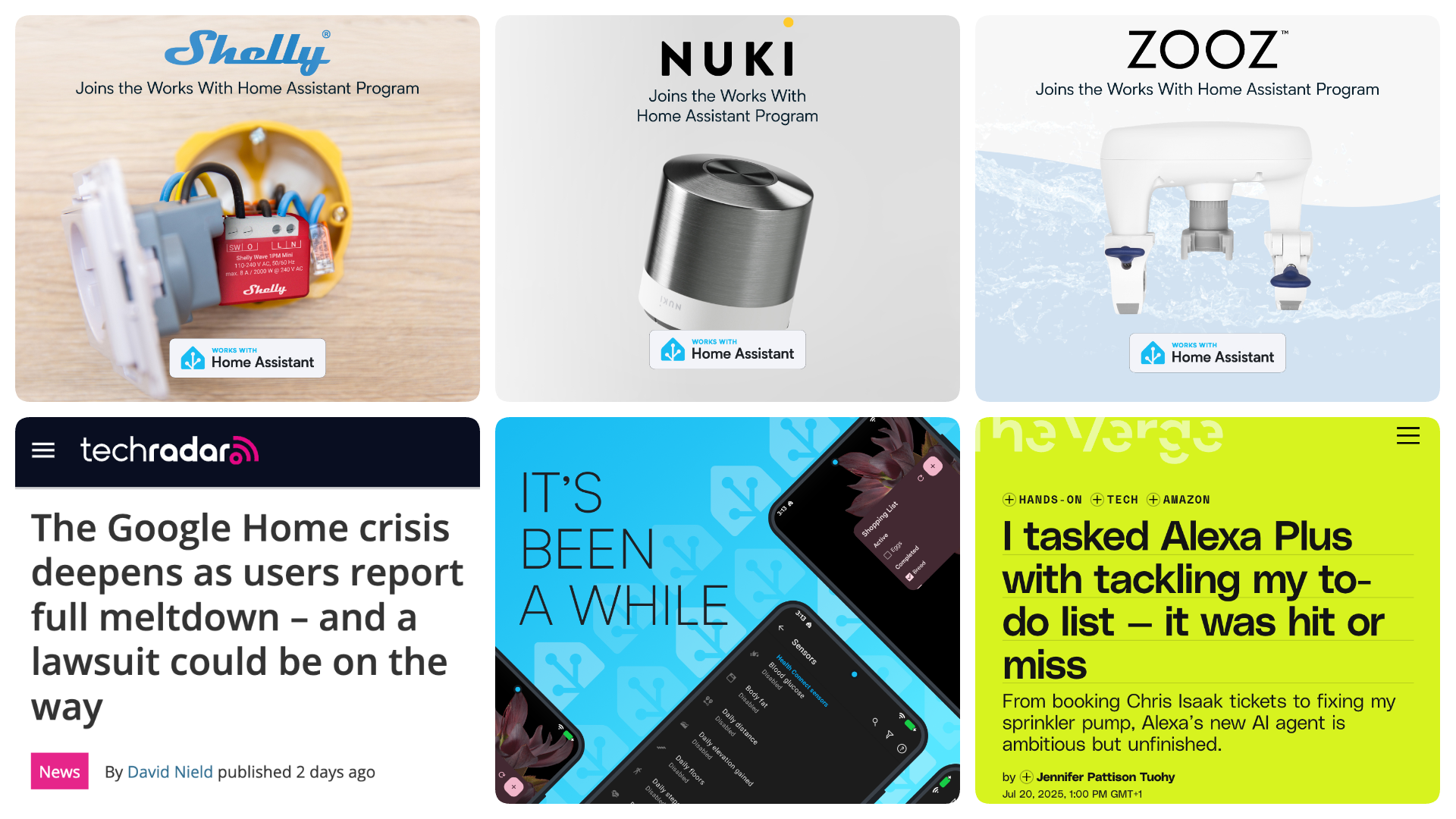
Works With Home Assistant
Our Works With Home Assistant program has not been sitting still this month. We’re celebrating Nuki, Zooz, and Shelly joining the program! Works With Home Assistant tests every device that carries the badge, ensuring it provides the best experience possible. Ultimately, it is a promise from every partner company to the community that they will keep supporting you and Home Assistant. I’m very proud that these major smart home companies are willing to do so!
Google sincerely apologizes
Google Home is sending everyone some mixed messages this month. The Home products have been functioning so badly that Google might get sued, and Anish Kattukaran, Chief Product Officer for Home and Nest, went on Twitter/X to tell everyone "I sincerely apologize for what you're experiencing and feeling!" as Google Assistant has been failing to accomplish basic tasks. This poor performance seems to be linked to Google Assistant’s transition to an AI-driven future, being powered by its Gemini AI. At the same time, it is still confident enough in the Nest line to next month raise prices 33% for a Nest Aware Plus subscription.
Almost plus
Google is not the only one struggling with the move to AI-powered voice assistants. Jennifer at The Verge has been testing the new AI-powered Alexa Plus in its Early Access phase, and found… It’s not living up to Amazon’s hype.
“While impressively, Alexa did manage to complete several steps, overall, the AI agent’s current features are neither broad enough nor seamless enough to replace my real-life personal assistant: me”
I guess it will take a bit longer before we get the all-knowing personal assistants that science fiction promised us.
Our plans for Android
One of our newest colleagues, Timothy Nibeaudeau, has introduced himself to the community this month! He’s our first full-time dedicated Android developer and shared his views and plans for the Android companion app on our blog. Give it a read and let Timo know what you think!
Community highlights
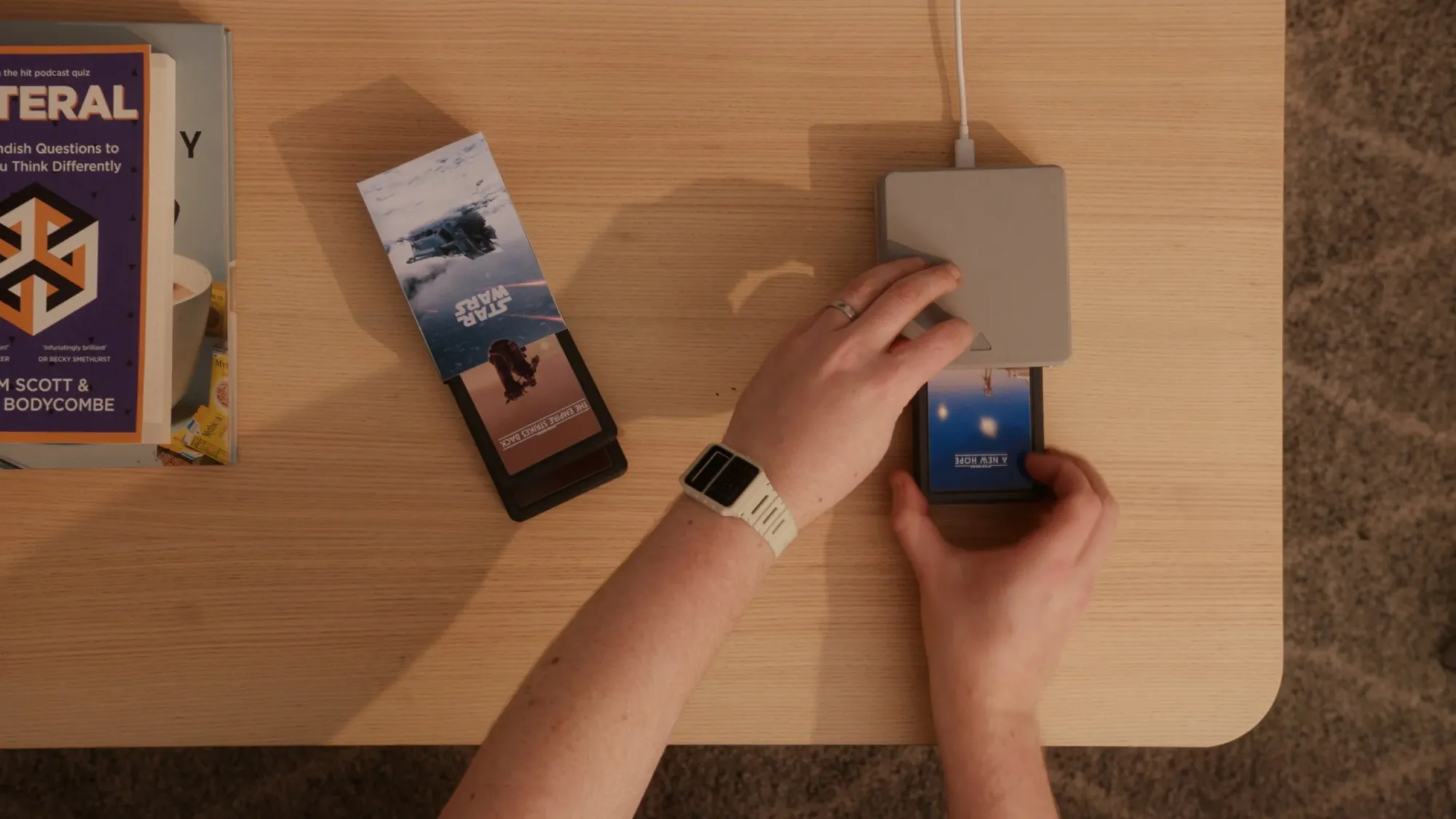
I personally love NFC tag readers and every new project I see that uses them brings me joy. This cartridge system by TheStockPot goes back to that nostalgic feeling of inserting a VHS tape into a deck and watching your favorite movie.

Last month, we had an ESPHome-based floor plan made out of Lego, this month KantSocialize takes it up another notch by 3D-printing a custom floor plan!

When I started building Home Assistant, I had some applications in mind, but automating huge LAN parties was not one I saw coming.
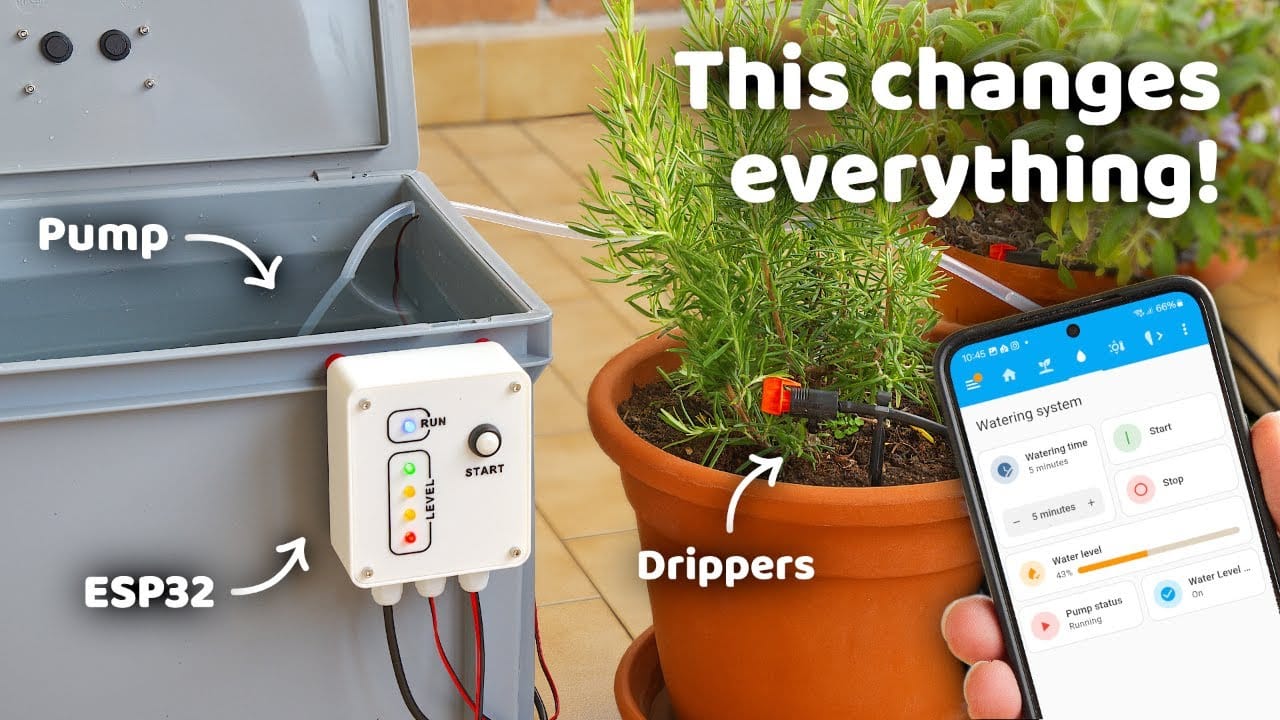
Smart plant irrigation devices can cost hundreds of bucks - it’s impressive to see this homemade ESPHome-based build by Maker Giovanni for just thirty!
Enjoy this newsletter?
Support the Open Home Foundation, subscribe to Home Assistant Cloud
Forward to a friend, sharing is caring.
Anything else? Hit reply to send us feedback or say hello. We read everything!
|







